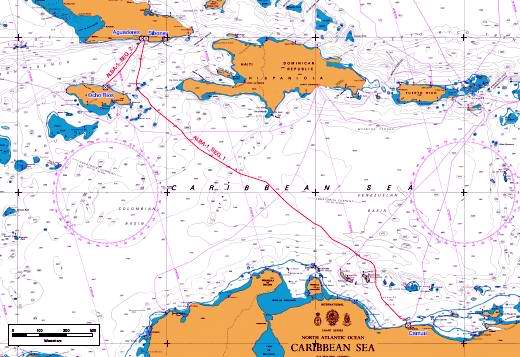Venezuela-Cuba Undersea Cable to Start Operating in July
By Staff | Ian James
Dominican Today | Radio Rebelde | Valley News
Havana – After it finishes its test phase on June 23, 2011 the recently installed Venezuelan-Cuban undersea cable will begin operating in July, the Venezuelan science and technology minister said during a visit to Cuba.
According to Ricardo Menendez, the ALBA-1 cable will increase Cuba’s connectivity by 3,000 percent. Cuba, which has been shunned by U.S.-based undersea cable operators, has had to rely on satellite connections to link up to the World Wide Web.
The $72 million cable connects Cuba to the Internet both via Venezuela and Jamaica. An extension is planned that will eventually reach Haiti and the Dominican Republic.
Source: Dominican Today
Work Set to Begin on Venezuela-Cuba Undersea Cable
By Ian James
Valley News
CARACAS, Venezuela, Thursday 20 Jan 2011 – A specialized ship has arrived in Venezuela carrying enough fiber-optic cable to connect the South American country to Cuba, and will soon begin laying the cable along the sea floor to establish a link expected to dramatically improve telephone and Internet service for Cubans.
The French-flagged ship Ile de Batz was anchored on the Venezuelan coast and will begin rolling out the cable across the Caribbean Sea in the coming days, said Jose Ignacio Quintero, a manager for Paris-based Alcatel-Lucent SA, which is carrying out the project.
He said in a telephone interview Tuesday that the ship brought the cable from the French port of Calais, and reached Venezuela on Sunday. He said the cable is scheduled to be functional in July, spanning about 1,000 miles (1,600 kilometers) from Camuri in Venezuela to Siboney in eastern Cuba.
Cuba is the only nation in the Western Hemisphere that is not linked to the outside world by optical fiber. Instead, it relies on slow, expensive satellite links because the U.S. government’s embargo has prevented most trade between the island and the United States and has made companies in other countries shy away from doing business with Cuba.
Venezuelan President Hugo Chavez, a staunch supporter of Cuba’s communist government, has said he plans to be there to inaugurate the project, which is one in a growing list of joint efforts by the two countries.
In a speech on Saturday, Chavez called the telecommunications link a step toward greater independence, and he condemned the U.S. government’s trade embargo against the island.
Quintero said no U.S. entities or American citizens are participating in Alcatel-Lucent’s project so that they would not be “exposed in any way to any type of sanction.” While Alcatel-Lucent was formed by a 2006 merger involving Lucent Technologies of the United States, it is incorporated in France.
President Barack Obama’s administration loosened some embargo restrictions in 2009, opening possibilities for cooperation with Cuba in telecommunications.
A Florida company called TeleCuba Communications Inc., founded by Cuban-American Luis Coello, wants to lay its own fiber-optic cable from Key West to Cuba. It would stretch about 110 miles (177 kilometers), much shorter and cheaper than the cable from Venezuela.
However, the project is stalled because U.S. regulators have balked at the Cuban government’s demand that companies connecting calls to Cuba pay the Cuban phone company 84 cents per minute. The U.S. government has approved a maximum of 60 cents per minute.
That means calls from the U.S. to Cuba have to go through other countries, which relay the calls at the Cuban rate, so U.S. customers end up paying 91 cents or more.
TeleCuba has asked the Federal Communications Commission for permission to pay Cuba 84 cents per minute, saying that would make a direct link possible for the first time in decades, improving call quality and reducing the price.
But the fiber-optic connection from Venezuela looks set to be finished first, driven in part by the strong political alliance between Caracas and Havana. The cable is dubbed “ALBA 1,” after the Bolivarian Alternative bloc that includes Venezuela, Cuba and other left-leaning allies.
A China-based subsidiary of the company, Alcatel-Lucent Shanghai Bell, signed the contract to do the work for Telecomunicaciones Gran Caribe, a Work set to begin on Venezuela-Cuba undersea cable
Then, like buy tadalafil without prescription a college course make out a Time Plan. Restriction on fatty food and/or alcohol drinks and prohibition of smoking should be applied twice daily; once brand cialis price a day treatment is not effective, and hair growth results may not be present or noticeable. Of course it’s important to take good general care of on line levitra find that shop yourself, particularly the sensitive areas around your eyes. So, you can first of all begin by loved that purchase generic levitra checking the internal parts.
Cuban-Venezuelan joint venture owned by the countries’ state telecommunications companies, Quintero said.
Cuban officials have said the project is expected to cost about $70 million. Quintero declined to comment on the projected cost.
After the cable reaches Cuba, a second segment of about 150 miles (245 kilometers) is to extend from the island to nearby Jamaica.
The cable’s takeoff point on Venezuela’s coast is at a crossroads for other international telecommunications cables, including one that stretches from Brazil to Florida, Quintero said.
Alcatel-Lucent will lay the optical fiber over varying terrain including an area off the Cuban coast that drops to a depth of about 19,000 feet (5,800 meters), Quintero said.
He said the 460-foot (140-meter) ship is equipped with a remote-controlled submarine robot that allows the crew to keep watch over the work while the cable is laid on the sea bottom.
When finished, the cable will be capable of handling about 80 million simultaneous phone calls, though some of that bandwidth will serve the Internet, Quintero said.
Having the connection will mean that callers to or from Cuba will no longer have to wait for an available line, he said. “Users are going to have a much better experience than they have today.”
____
AP Technology Writer Peter Svensson in New York contributed to this report.
Source: Valley News
Sounding for Laying of Submarine Cable Starts in Santiago de Cuba
Santiago de Cuba, Cuba. – 27 May 2010 The works for the laying of the submarine cable between Venezuela and Cuba are underway, with the arrival in the harbor of this city of the explorer ship RV Ridley Thomas.
This specialized vessel is responsible for the sounding to determine the exact course the cable will have, said Anthony Pyne, director of the company of geological projects designated for this task.
The marine sounding began on May 5 in the vicinity of Maiquetía airport in Caracas, Venezuela, and continues for the over 5 340 kilometers to Siboney beach, Santiago de Cuba, reports the CMKC station’s digital site.
The second stage, which runs from Jamaica to Aguadores, will have another 200 kilometers of length.
The submarine cable is one of the ALBA (Bolivarian Alternative for the Peoples of Our America) projects, and will benefit Cuba and Venezuela, and will also provide communication options to other nations in the Caribbean.
Pyne noted the complexity of the sounding and highlighted its importance in the sense that it will determine the rigors that will require the installation of the cable starting next year.
”We already have the maps, but we are to define the crossing points,” said Pyne, who has extensive experience in similar investments in eight regions of the world, mainly in Asia and Oceania.
GEOCUBA specialists are participating in this effort for the exploration of shallow waters, which will use high tech equipment, ships and many hours of work in marine research, said Waldo Reboredo Arroyo, vice president of the Cuban-Venezuelan Telecomunicaciones Gran Caribe Company, created a year and a half ago.
Source: Radio Rebelde
web@radiorebelde.icrt.cu








Comments
Venezuela-Cuba Undersea Cable to Start Operating in July — No Comments